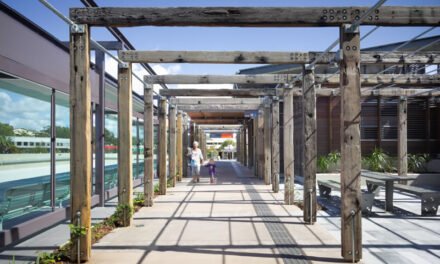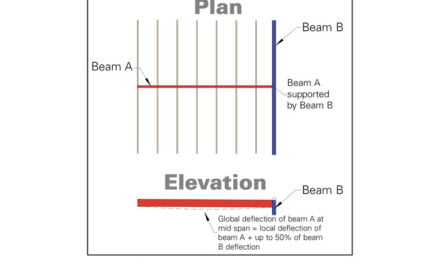The Royal Institute of British Architects has announced their best building.
Every two years the Royal Institute of British Architects (RIBA) selects its favourite 20 new builds from around the world in May, before announcing the RIBA International Prize for the building that best exemplifies design excellence and meaningful social impact at the end of the year. From a longlist that included the breathtaking Audain Art Museum (see TTN June 2018) and Turkey’s ground-breaking Sancaklar Mosque, a comparatively low-cost school accommodation – Children Village in Formoso do Araguaia, Brazil – has emerged the 2018 winner.
Perched on the edge of a rainforest, Children Village is a 25,000m2 complex that provides boarding for 540 senior school children (13-18 years old) at the Canuanã School. Run and funded by the Bradesco Foundation, it is one of 40 schools providing education for disadvantaged local children and is the first of their projects to use design to improve the quality of education.
Brazilian architecture firm Aleph Zero worked with compatriot studio Rosenbaum on the design, which began with the architects spending time talking to the children about what they wanted for this home away from home. They spent 10 days listening to the students, playing games and holding workshops to learn what would make learning easier and help foster a sense of community. Where once the children lived in 40-person barracks, the new design has smaller six-person pods, and a series of communal areas where children can play, study, relax and commune with friends, knowing that privacy is now possible.
The boys and girls have separate, identical buildings, notable for boys hanging off the upper decks and girls organising Pilates classes. Tall, perforated walls under soaring shade-giving roofs provide ample shade and natural climate control, obviating the need for air conditioning, even in 45°C heat.
Because of the area’s remoteness, the building was constructed from prefabricated light timber framing, that could be moved in with ease, along with adobe bricks (earth blocks made from local soil) and locally grown heavy timbers. Eucalyptus glulam columns dominate the design, dividing up spaces and creating long breezeways that are protected from the rain that is channelled out onto the surrounding gardens and interior courtyards from a very large version of the region’s familiar tin roof. All the timber elements were sourced from sustainable forestry.
Two of the designers – Gustavo Utrabo and Pedro Duschenes, founders of Brazilian architecture firm Aleph Zero – were also the recipients of the RIBA International Emerging Architect 2018. Former classmates, their practice operates in a range of areas, from the design of furniture, exhibitions, residential and commercial architecture, to urban-scale projects for both public and private sector clients. Children Village is the first large-scale work for the young architects and, like their other projects, it focuses on natural resources and sustainable practice, as well as meeting local needs.
The complex has encouraged a sense of community among the students and helped to encourage independent study and free play, as well as creating more friendships than were possible when such large groups had to spend so much time together in the old accommodation.
It’s not what the students first imagined in their talks. As Urtrabo told The Guardian, “The challenge was to convince the students and teachers that the local materials of earth, bricks and timber could represent progress – that being modern didn’t have to mean glass, steel and air-conditioning.”
But the success of the finished building has removed all doubts. The children have adapted it for their needs in ways that weren’t first imagined, and its growing swathe of top awards has added a polish for the students as well as the architects.
Julia Barfield, Chair of the RIBA Awards Group, praised the Aleph Zero duo at the time of their RIBA International Emerging Architect 2018 win, saying: “It’s always a pleasure to be able to recognise and reward emerging talent. We were impressed by the way the architects embraced the question of how architecture can stimulate its users, as well as the surrounding community, in a region rich in natural resources but poor in opportunities, education and economic resources. Aleph Zero are philosophical, reflectful and thoughtful architects who are reinterpreting the Brazilian vernacular using the abundant natural resources that surround the site in an innovative way which inherently promotes both economic and environmental sustainability.”
Both the Aleph Zero and Rosenbaum teams were thrilled by the latest RIBA accolade. As Marcelo Rosenbaum and Adriana Benguela, directors of Rosenbaum, told Dezeen, media partner for the RIBA International Prize 2018, “This award strengthens our understanding of architecture as a tool for social transformation, a tool that transcends construction and creates a deep connection between young people and their ancestors and knowledge.”
For more, visit www.architecture.com, www.alephzero.arq.br or rosenbaum.com.br












